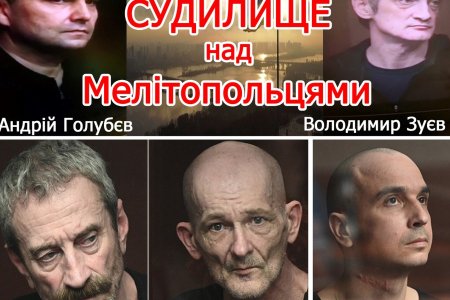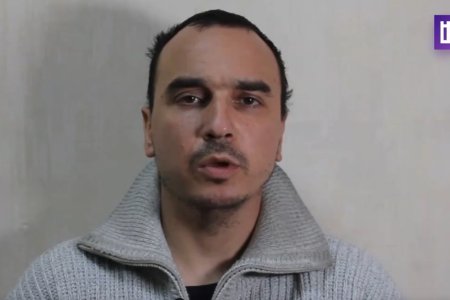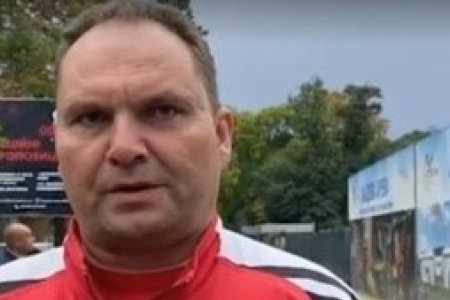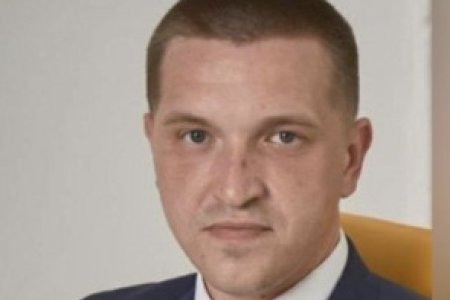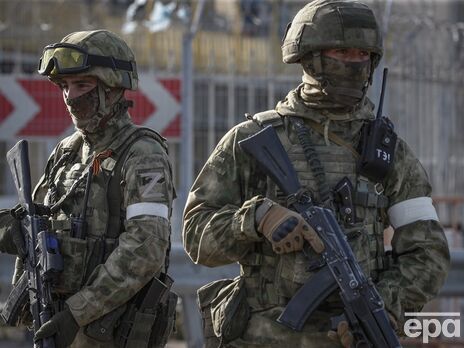
Two more Ukrainians have been found imprisoned in occupied Crimea over a year after being seized in Berdiansk by the Russian invaders and disappearing. The aggressor state has yet again seized Ukrainians from Ukrainian territory and is accusing them of an alleged attack on a Ukrainian collaborator, while claiming this to be ‘an act of international terrorism’.
The Crimean Human Rights Group reported in late June that Viktor Rastorhuev [b. 1978] and V. Kryvtsun/b> were imprisoned in SIZO [remand prison] No. 2 in occupied Simferopol. This new SIZO was opened in 2022, almost certainly to accommodate the huge number of civilians whom Russia was seizing in newly occupied territory and illegally holding in Crimea. According to CHRG’s information, both men are charged with ‘planning an act of international terrorism’ under Article 361 § 1 (and 30 § 3) of Russia’s criminal code, with the charges pertaining to an alleged attempt on the life of Oleksandr Saulenko, a collaborator whom Russia installed as supposed ‘mayor’ of occupied Berdiansk.
Virtually all the scant information or allegations have, from the outset, only referred to Vitaliy Rastorhuev, while claiming this to be ‘a terrorist act by Ukraine’s Security Service’. The Russian state-controlled RIA Novosti asserted on 23 August 2022 that the Russian FSB [security service] had “averted a terrorist attack by the Ukrainian Armed Forces [sic] at a mass event in Berdiansk.” They go on to say that the person detained has given ‘a confession that corresponds to the video’ they have clearly been given. The video shows a person, whose face cannot be discerned, appearing to plant something under one of around four parked cars. There is nobody around, and there is nothing that could confirm that this was a genuine video, and not especially staged, after the seizure of a supposed ‘suspect’. The Russian ‘investigators’ claim that Vitaliy Rastorhuev was, on instructions from the Security Service, planning to blow up a homemade explosive device on 16 July. Rastorhuev is asserted to have obligingly provided ‘a confession’ to fit the charge of ‘international terrorism’. The Russian reports ‘quote’ him saying that he had planted an explosive under a car on Shevchenko St that morning and had planned to activate this in the Slobodka micro-district near the Mayak House of Culture. Employees of the military -civilian administration Saulenko and Borovko were supposed to be driving in that car.” Even using terms aimed at claiming official status cannot turn an attempt on the life of a traitor, collaborating with the invaders, into ‘an act of international terrorism’. It is almost certainly for this reason that Rastorhuev is asserted to have stated, most implausibly, that the plan had not been to kill Saulenko and Borovko, that on that date “a city event was planned at the Mayak House of Culture which was to be attended by civilians, including people living in Russia.
There have been many attacks on collaborators and Russian-installed occupation ‘leaders’. Not one attack carried out by either Ukrainian partisans or the Ukrainian Armed Forces has targeted civilians. This is in marked contrast to the number of times that Russia has bombed or shelled clear civilian sites. Rastorhuev’s alleged ‘confession’ indicates only that, back in August 2022, Russia was already planning to accuse Ukrainians in their own land of ‘international terrorism’. As reported earlier, this is a relatively new article of Russia’s criminal code, introduced in 2016 and, before Russia’s full-scale invasion of Ukraine, not having resulted in any convictions. Russia is now using such charges against at least 20 Ukrainians who were illegally seized in Ukraine by the invading forces or Russian FSB. An ‘act of international terrorism’ is supposed to be an explosion, act of arson or other actions, committed outside Russia and jeopardizing the life, health, freedom or inviolability of Russian citizens “for the purpose of violating the peaceful co-existence of states and peoples, or aimed against the interests” of Russia.
Rastorhuev purportedly continued by saying that he was supposed to ring a certain number to activate the explosive device, and that he then planned to post a ‘photo report and posts on Telegram channels.” It is, in all seriousness, claimed that he said: “Since the beginning of the special operation they began to instil in me a feeling of hatred to residents of Russia and taught me to use homemade explosive devices.”
While curious that the state media would not show a videoed ‘confession’ were this available, it is certainly not impossible that Rastorhuev did say this. It is, however, inconceivable that he used the Russian term ‘special operation’ voluntarily and extremely suspicious that the ‘confession’ seems to deliberately contain all the elements of the charge of ‘international terrorism’. Since 2014, the FSB have been using such videoed ‘confessions’ of Ukrainians given while they were held incommunicado and without access to independent lawyers. In virtually all cases, the people have later retracted such ‘confessions’ as given under torture.
The ’investigators’ story has been further elaborated upon since then, with the claim now being that Rastorhuev was ‘recruited from the ‘Opir’ [‘Resistance’] civic movement, supposedly created after the beginning of the full-scale invasion by Yevhen Astakhov from Ukraine’s Security Service [SBU]. It is asserted that “this organization planned to carry out acts of terrorism and sabotage, including those aimed at the elimination of members of military-civilian administrations, and countless men and women on the territory of the Zaporizhzhia oblast.”
It is also typical in such cases for the FSB to try to deny any ideological grounds for the alleged acts of sabotage, etc. In this case, it is claimed that Rastorhuev was ‘recruited by the SBU who promised to get his loan repaid early (no explanation is provided as to how they would do so) and to get his family to government-controlled territory.
It is thus clear that Rastorhuev was seized as early as 16 August 2022, although his imprisonment in occupied Crimea was only confirmed in January 2023. Even if he was taken to Crimea immediately after his seizure, there is nothing at all to suggest that he was officially detained and provided with a lawyer of his choice. In fact, the first indication of his imprisonment in occupied Simferopol came from the second half of January 2023 when, for example, Kommersant reported that Rastorhuev and his lawyer had appealed against his imprisonment. He remains in detention, facing illegal charges under the aggressor state’s legislation and a potential life sentence from the same Southern District Military Court that has been responsible for around 100 politically motivated sentences against Crimean Tatar and other Ukrainian political prisoners.
